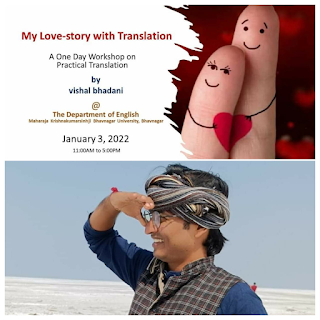Hello Monks...
"Writers make national literature, while translators make universal literature."
Jose Saramago rightly said the above lines. Today I want to talk about the workshop on Translation Studies. Yes, on 3rd January 2022 we attended a workshop on Translation Studies by Vishal Bhadani sir at the Department of English, MKBU. This blog is assigned by Prof.Dilip Barad sir as a part of a thinking activity about the learning outcome of this workshop. So this workshop is for one full day and there were two sessions in this workshop. Sir discussed the metaphors for translation, myths people have about translation, and how careers can be made in the translation field. He brings a very interesting title to this workshop. "My love story with a translation" is the title of the workshop.
: Learning outcome :
1) Has your understanding of translation improved?
Yes, my understanding of translation is improved because this is the first translation workshop that I attend. After this workshop, I came to realize the translation is not what we used to think of, it's beyond our imagination. Also I realize that Translating from one language to another is the most delicate of intellectual exercises; compared to translation, all other puzzles, from a bridge to crosswords, seem trivial and vulgar. To take a piece of Greek and put it in English without spilling a drop; what a nice skill!.He also referred to Gayatri Chakravarthy Spivak she said that
"Translation is the closest reading of the text."
In the first session, he talked about that People have several myths about translation like,
- Untranslatability
- Translation is a small industry
- Most translators translate book
- Machine translation is crushing the demand for human translation
- Translation is either beautiful or faithful
So sir very well explain that these are all myths, there is scope in the translation field, machines can not translate regional words. So my understanding of translation has improved.
2) Can you write about translation in terms of metaphors?
Yes, there are several metaphors about translation and sir gave 7 metaphors to explain how translation Studies are connected with each other.
1) Moon(Nature) :
Moon is the first metaphor I'd like to provide. The finest illustration of translation is the Moon. The moon does not have its own beauty; rather, it is a reflection of the sun's light. The sun's radiance gets translated into the tranquility of the moon. Similarly, translations can occasionally be more beautiful than the original material.
2) Head of Lord Ganesha (Mythology) :
Lord Ganesha's head is another metaphor. With this metaphor, we may claim that translators do not set a word as it is, but rather place some acceptable terms. to substitute a comparable item for the original; this suggests that we can substitute similar terms for the original. That appears to be a close match to the original.
3) Lord Rama and Navik (Epic) :
The text is Lord Rama, the translation is Navis, the dictionary is a woman and the translation is 'Charan Shudhdhi.' We can observe the translation process in this metaphor. Do not attempt to translate without the aid of a dictionary.
3) What according to you is the most difficult aspect of practical translation?
The most difficult component of practical translation, in my opinion, is to comprehend the literary meaning of a given text, paragraph, phrase, or line, and then to find the suitable word, or translation, that does not alter the sense of the original work. The issue that occurs in our minds throughout the translation, and which Sir also answered, is that Google also offers translation, and there are other applications accessible, so what is the need for human translators??? Machine or application are don't always give the appropriate meaning of some terms, according to sir's response.
4) learning outcome from the workshop
"Translating means having the honesty to stick to an allusive imperfection."
This workshop has taught me a lot of useful information. Things like the scope of part-time and full time translation, for example. You must have an full-time understanding of Humanities and Fine Arts, Journalism and Mass Media, Commerce, Management, Law, Education, Science, Social Work, Engineering, and Architecture if you want to be a translator. It is not a simple process to translate. When translating, you must be extremely cautious since one incorrect word can completely change the meaning. Another thing I learned traveler from the workshop is that while translating, you must utilizea dictionaries. A good traveler is an excellent translator. You must pay attention to what is going on around you in order to apply it to your job. And yes We have done one exercise in a paper. Here is the picture of that exercise.
- Sir gave us some names of the websites which helps us to know the news analysis :
- Scroll.in
- The wire
- Washington post
- Big Think
- M I T
- Service Spacethe
- He askes to do translation of this words or lunch exercise we can say...
- ભાઈ વગર ની બેન
- બેન વગર નો ભાઈ
- મારાં લોકભારતી ના શિક્ષણ એ મારી કેળવણી કરી.
- ઝેર તો પીધા છે જાણી જાણી.
- Imperfect is the joy not shared by all.'
- 'ફરે તે ચરે અને બાન્ધ્યો ભુખે મરે.'
To conclude I want to say that It was really a great informative workshop in which sir also made us translate some of the sentences to make us feel the real brushing of the mind needed in translation. He also gave us tips to improve our English language and how we can enter into this line.
Thank you..





No comments:
Post a Comment